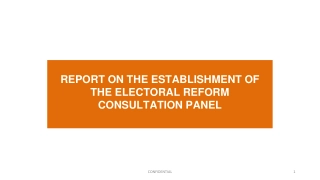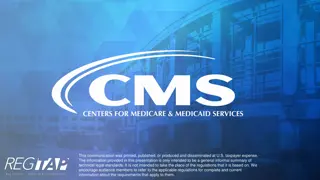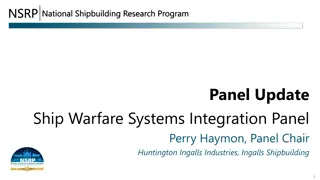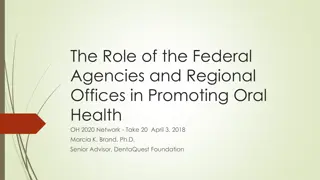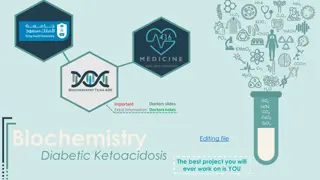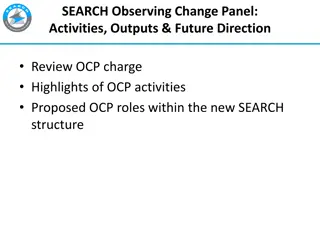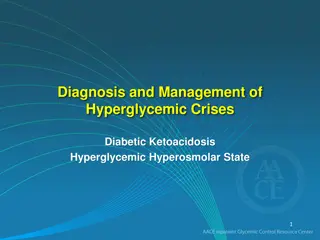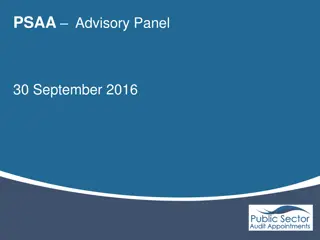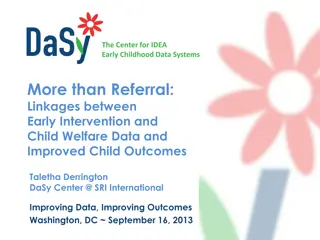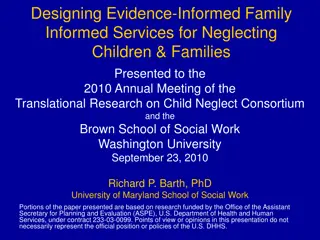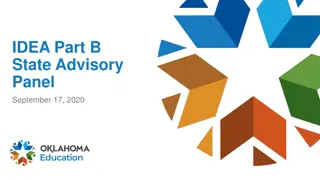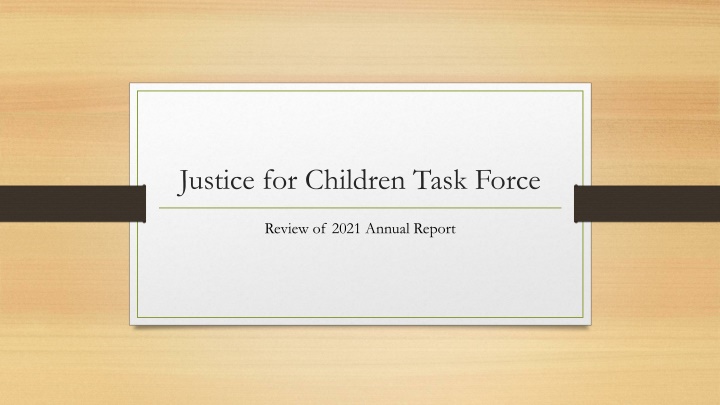
Improving Child Welfare System in Maine: Justice for Children Task Force Review
The Maine Justice for Children Task Force aims to enhance the safety, permanency, and well-being of children in the state's welfare system through collaborative efforts with various stakeholders. Their goals include identifying strengths and barriers, providing training, monitoring programs, encouraging participation, and establishing goals to address issues affecting children's welfare.
Download Presentation

Please find below an Image/Link to download the presentation.
The content on the website is provided AS IS for your information and personal use only. It may not be sold, licensed, or shared on other websites without obtaining consent from the author. If you encounter any issues during the download, it is possible that the publisher has removed the file from their server.
You are allowed to download the files provided on this website for personal or commercial use, subject to the condition that they are used lawfully. All files are the property of their respective owners.
The content on the website is provided AS IS for your information and personal use only. It may not be sold, licensed, or shared on other websites without obtaining consent from the author.
E N D
Presentation Transcript
Justice for Children Task Force Review of 2021 Annual Report
Purpose The Maine Justice for Children Task Force ( the Task Force ) is hereby continued as a collaborative, multidisciplinary Task Force to improve safety, permanency, and well-being for children in the State of Maine child welfare system. It is anticipated that the work of the Task Force will regularly occur in conjunction and collaboration with the work of the Executive and Legislative Branches, along with appropriate child welfare entities. This collaboration may include joint meetings designed to maximize the experience of the membership of each committee, prevent redundancy, and be respectful of members work schedules.
The Justice for Children Task Force will Identify strengths that contribute to the safety, permanency, and well-being of children in the State of Maine child welfare system; Identify systemic barriers which may have a negative impact on the safety, permanency, and well-being of children in the State of Maine child welfare system; Prioritize issues and develop joint solutions to remove identified barriers; Identify the training needs of stakeholders in child protective proceedings; Adopt a training curriculum for stakeholders in child protective proceedings; Monitor implementation of the Court Improvement Programs (CIPs);
The Justice for Children Task Force will Encourage widespread participation in Child and Family Services Reviews (CFSRs); Sponsor regular local meetings involving all stakeholders which will provide training, foster collaboration at the local level, and identify issues which have statewide implications; Establish other goals for the Task Force, establish timelines for steps toward each goal, and monitor and evaluate progress toward the established goals; Address other topics, identified by the Task Force, that have an impact on the safety, permanency, and well- being of children in the State of Maine child welfare system; Provide input and feedback regarding statewide performance standards for the timely resolution of matters involving children and families in the child welfare system; and Develop, establish, and operate programs designed to improve the assessment and investigation of suspected child abuse and neglect cases, including cases of suspected child sexual abuse and exploitation, in a manner that limits additional trauma to the child and the child s family.
Authority The Task Force shall seek input, suggestions, and recommendations from individuals and groups within and outside Maine state government. The Task Force is authorized to study policies and procedures considered by, or in effect in, other states and any other model policies or procedures. The Task Force may propose recommendations generally or may propose rules, rule amendments, statutes, orders, or policies.
Meetings The Justice for Children Task Force meets four times a year. In 2021, there was an average of 33 participants per meeting. Most meetings featured: Updates by members including the Maine Judicial Branch, the Office of Child and Family Services (OCFS), the Office of the Attorney General, and the Maine Commission on Indigent Legal Services. Presentations on pertinent child welfare topics. Updates on action steps taken on strategic plan initiatives.
Child Welfare Topics Addressed in 2021 Review of the Maine Homicide Report and statewide resources presented by the Maine Coalition to End Domestic Violence (MCEDV); An introduction to the Youth Leadership Advisory Team (YLAT) and strategies to support authentic youth engagement; Effects of the pandemic on individuals involved in the child welfare system, system processes, and agency communication; Collaboration and coordination needed for Maine to comply with the Family First Prevention Services Act;
Child Welfare Topics Addressed in 2021 Data sharing with a focus on the number of children in care as well as new child welfare court filings; and Discussion of various potential training topics for task force members and system stakeholders.
Strategic Plan Items Completion of the joint website for the three citizen review panels; Research and implementation of a virtual child welfare parent curriculum; A race and equity data assessment; and Plan and conduct a statewide stakeholder child welfare training.
Information Sharing Joint Citizen Review Panel Website: Project began in November 2019 in collaboration with MCWAP and CDSIRP. Content and design were completed in October 2020. Website went live in February 2021. Quarterly Meetings Beginning September 2021, the three chairs/designees of the Citizen Review Panels convene a meeting to encourage collaboration and work process without duplication.
Parent Curriculum August 2020, the Task Force added the development of information sessions for parents involved in the child welfare system to the Task Force s strategic plan. Goal: Offer voluntary classes to parents, focused on understanding child welfare agency processes, court procedures, and suggested best practices for parents to implement in order to be successful throughout the life of a child welfare case. The sessions are led by parents with lived experience in the child welfare system or parents who have navigated multiple systems.
Parent Curriculum December 2020: First meeting of the workgroup. Throughout 2021: Secured funding for The Opportunity Alliance (TOA) to implement a one-year pilot project for Child Protection 101: For Parents, By Parents. A work plan was developed, curriculum was outlined, and stakeholders were tasked with creating pre-recorded video segments to be used at all the sessions.
Parent Curriculum Data Collection: Pre- and post-parent surveys; Gauging time to permanency; Participation in family visitation; Participation and engagement in reunification services; and Attendance at court proceedings.
Race and Equity Data Assessment Formed the Race and Equity Subcommittee. Members are project partners including: The Maine Judicial Branch; The Department of Health and Human Services, Office of Child and Family Services; Department of Corrections; Department of Public Safety; Department of Education; The Maine State Legislature; and Other community stakeholders.
Race and Equity Data Assessment Goals: Assess systemic data collection with regard to race and other important markers of equity; Better understand what systems are in place for the collection and sharing of aggregated data on various data points in order to inform policy decisions, measure fairness and equity, and provide the courts and agencies with data about the people and populations they serve.
Data Point Set Race; Ethnicity; Connection with tribe/band/nation; Enrollment or eligibility for enrollment with a federally recognized tribe(s); Sexual orientation; Income; Location; Gender; Gender identity; and Disability.
Action Steps May 2021: Self- Assessment- an effort to inventory which data are collected, how they are collected, and how those data are coded in the various systems. October 2021: Public Consulting Group (PCG) was hired through the RFP process to create a data mapping inventory and produce a final report with findings and recommendations.
Data Mapping Inventory Designed to provide an overview of the current systems and processes for the collection of the data point set by Project Partners and will include: When the Project Partners interface with the child welfare system; The key decision points in the child welfare process made by Project Partners; Which data from the data point set are currently collected; Opportunities for data collections; When data from the data point set are currently collected; How the data from the data point set are collected; and Availability of data on the total number of cases and individuals served.
Final Report Content: Barriers, if any, identified for collection of data from the data point set; Best practices for the collection of data; Opportunities, advantages, and disadvantages for interagency aggregated data sharing; and A proposed evaluation plan for the collection and possible sharing of aggregated data pertaining to the data point set by the Project Partners. To be completed by September 30, 2022.
Continuing Education Subcommittee National Institute for Trail Advocacy (NITA) hosted six virtual, skill-based training sessions for child welfare attorneys and guardians ad litem. Two separate topics: Direct and Cross Examinations and Exhibits and Impeachment. Each session was four hours. Learn by doing model. Feedback was overwhelmingly positive.
Continuing Education Subcommittee Plenary session held on October 26, 2021. Effective Assistance: How to Advocate for Maine Families Both In and Out of the Courtroom. Sessions focused on strategies for all stakeholders, at all stages of a child welfare case, to effectively support the families and child with whom they work to promote successful child welfare case outcomes. Between both trainings, approximately 1, 398 hours of continuing legal education credit hours, 160 ethic credits, and 425 continuing professional education credit hours for guardians ad litem were issued.

